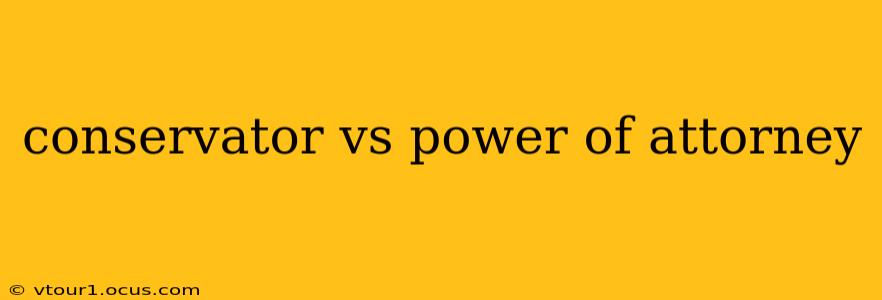Choosing between a conservator and a power of attorney is a crucial decision for individuals planning for their future or managing the affairs of someone who can no longer do so themselves. While both involve managing someone's affairs, they differ significantly in their scope, legal implications, and the process of establishment. This comprehensive guide clarifies the distinctions between these two legal mechanisms.
What is a Conservator?
A conservator, also known as a guardian or conservator of the estate, is a person appointed by a court to manage the financial affairs and/or personal care of an individual deemed incapable of doing so themselves. This incapacity can result from various factors, including:
- Mental illness: Conditions that significantly impair judgment and decision-making.
- Dementia: Progressive cognitive decline affecting memory, reasoning, and judgment.
- Physical disability: Conditions that prevent an individual from managing their own affairs.
- Serious injury: Traumatic brain injury or other severe injuries limiting self-sufficiency.
The court appoints a conservator after determining that the individual lacks the capacity to manage their own affairs. The conservator's powers and responsibilities are clearly defined in the court order, which typically includes managing finances, paying bills, making healthcare decisions, and even overseeing personal care. The court maintains ongoing oversight of the conservator's actions.
What is a Power of Attorney?
A power of attorney (POA) is a legal document that grants someone else (the "agent" or "attorney-in-fact") the authority to act on behalf of another person (the "principal"). Unlike a conservatorship, a POA is created by the principal themselves while they are still competent. The principal can specify the scope of the agent's authority, which can be broad or very specific.
Types of Power of Attorney:
- General Power of Attorney: Grants broad authority to the agent to handle most financial and legal matters.
- Durable Power of Attorney: Remains in effect even after the principal becomes incapacitated. This is crucial for ensuring continued management of affairs during incapacity.
- Limited Power of Attorney: Grants authority only for specific tasks or situations. For example, an individual might grant limited POA for managing their finances during a period of travel.
- Healthcare Power of Attorney (Medical POA): Specifically addresses healthcare decisions. This is often referred to as an advance directive or healthcare proxy.
Conservator vs. Power of Attorney: Key Differences Summarized
| Feature | Conservator | Power of Attorney |
|---|---|---|
| Appointment | Appointed by a court | Created by the principal (while competent) |
| Incapacity | Requires a court determination of incapacity | Can be effective even with incapacity (durable POA) |
| Authority | Defined by the court order | Defined by the document itself |
| Oversight | Subject to court oversight | Generally no court oversight unless issues arise |
| Termination | Court order required to terminate | Can be revoked by the principal at any time (unless durable) |
How Do I Choose Between a Conservator and a Power of Attorney?
The choice depends heavily on the individual's circumstances and their level of capacity. If someone is already incapacitated, a conservatorship is the only option. For individuals who are still competent, a durable power of attorney is generally preferred, offering greater control and avoiding the court process. However, if concerns exist about potential abuse or disputes, a conservatorship might offer greater protection.
It's vital to consult with an estate planning attorney to determine the most appropriate course of action based on your specific situation. They can help you understand the nuances of each option and create a plan that protects your interests and the interests of your loved ones.
What happens if someone doesn't have a POA or Conservator and becomes incapacitated?
If an individual lacks capacity and doesn't have a power of attorney or a conservator already in place, family members or other interested parties may need to petition the court for the appointment of a conservator. This process can be lengthy, complex, and potentially expensive. It emphasizes the importance of proactive estate planning.
Can a power of attorney and a conservatorship exist simultaneously?
While unusual, it's possible. For example, a durable POA might handle routine financial matters, while a conservator addresses more complex issues or specific aspects requiring court supervision. However, this often requires careful coordination to avoid conflicts.
What are the costs associated with each?
Conservatorships often involve significant court costs, attorney fees, and ongoing reporting requirements. Power of attorney creation usually entails lower costs, primarily those associated with legal document preparation.
This information is for general guidance only and does not constitute legal advice. You should always consult with a qualified legal professional for advice tailored to your specific situation.
